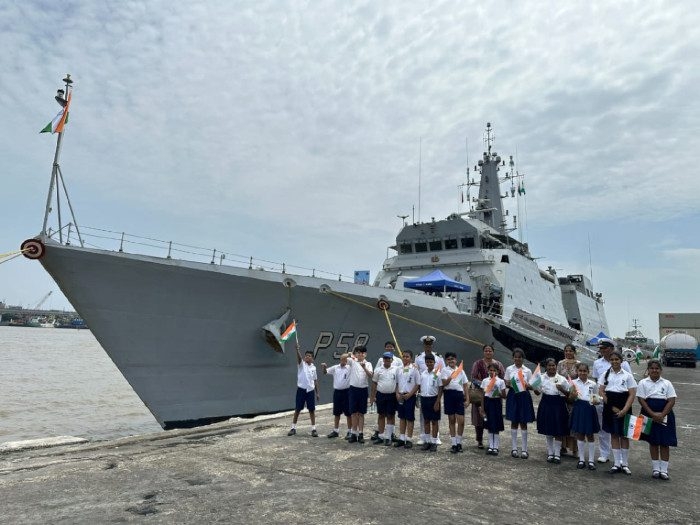Nigeria and India have taken significant steps to bolster their military partnership and enhance maritime security in the Gulf of Guinea, a region critical for maintaining sea lanes as conduits of international trade. A clear demonstration of this collaboration was the recent arrival of the Indian Navy Ship (INS) Sumedha in Lagos for a three-day port call.
During the port visit, representatives from both navies engaged in various training activities and discussed ways to further enhance their cooperation. The Indian Defence Attaché to Nigeria, Col. Romi Singh Legha, highlighted the long history of defence cooperation between the two countries and emphasized the importance of increased interoperability between their navies, especially in anti-piracy operations in the Gulf of Guinea.
INS Sumedha, commanded by Cdr MC Chandeep, is third of the indigenously designed and manufactured ‘Saryu’ Class Naval Offshore Patrol Vessel (NOPV). The ship has the capability to be deployed for multiple roles independently and in support of Fleet Operations. It is equipped with weapon systems, sensors, state of art navigation, communication systems and Electronic Warfare suites. INS Sumedha has undertaken various Fleet support operations, coastal and offshore patrolling, ocean surveillance and HADR missions in the past, including the recently conducted Op Kaveri for evacuation of Indian diaspora from war hit Sudan in April 2023.
The Indian Navy’s visit was primarily aimed at supporting the Nigerian Navy in its anti-piracy operations, with a focus on training, exercises, and information sharing. This collaborative approach is expected to further strengthen security efforts in the Gulf of Guinea.
Rear Admiral Mustapha Hassan, the Flag Officer Commanding of the Western Naval Command, emphasized the importance of such visits in improving friendship, cooperation, and interoperability between the two nations. He noted that the collaboration between Nigeria and India has a rich history that spans over five decades and includes training support, hardware exchanges, port visits, and joint exercises. These interactions have contributed to enhancing national security and maritime security in the Gulf of Guinea.
The joint exercise called Passex, scheduled to take place between the Nigerian Navy and the Indian Navy, is expected to consolidate the security gains achieved in the Gulf of Guinea. Such exercises and training sessions are vital for improving the capabilities of both navies and ensuring the safety of maritime trade routes in the region.
This strategic collaboration comes in the context of strengthening bilateral relations between Nigeria and India. Notably, Nigeria recently approved a $1 billion deal to enhance its defence industry, with support from the Indian government’s Military-Industrial Complex. This deal aims to make the Defense Industries Corporation of Nigeria (DICON) 40% self-sufficient in local manufacturing and production of defence equipment by 2027. It is a significant milestone for DICON, which has been grappling with underfunding and operational challenges.
The maritime partnership between India and Nigeria also reflects the broader trend of expanding defence cooperation between India and African countries. Last year, the Indian Navy’s Talwar-class frigate INS Tarkash visited Lagos as part of its voyage to strengthen friendship and cooperation. During the visit, Nigerian Navy personnel received tactical and operational training, reflecting the commitment to shared maritime security efforts.
Furthermore, India conducted its first-ever trilateral Navy exercise with Africa, involving the navies of India, Tanzania, and Mozambique. This exercise included various professional disciplines and focused on handling asymmetric threats, boat and helicopter operations, casualty evacuation drills, fire-fighting exercises, and visit board search and seizure (VBSS) drills. It highlighted India’s determination to expand defence partnerships with African nations.
The joint efforts between India and Nigeria underscore the importance of international collaboration in maintaining maritime security, safeguarding trade routes, and combating piracy in the Gulf of Guinea. These initiatives enhance the security and stability of the region, benefiting both countries and the broader international community.


